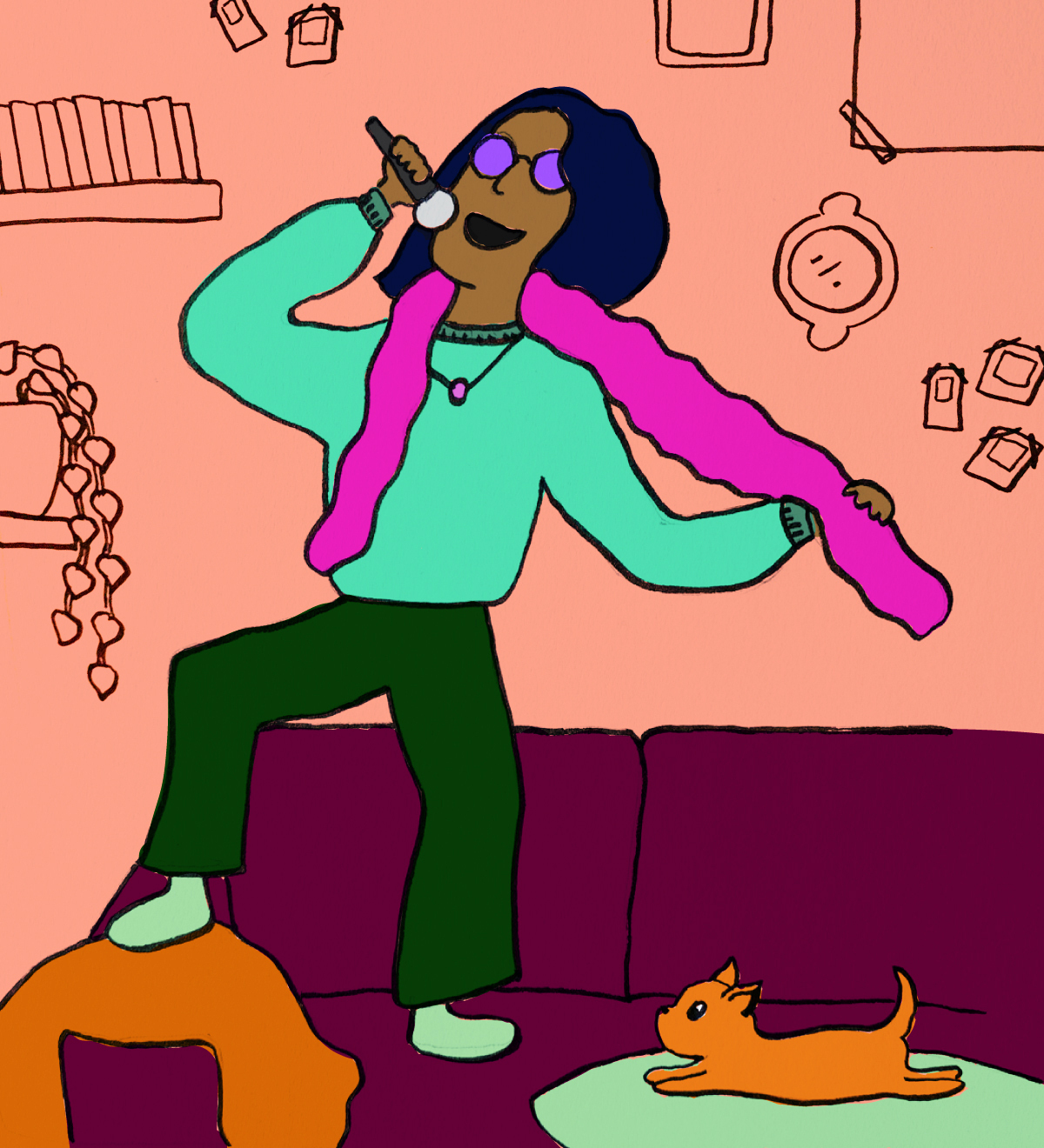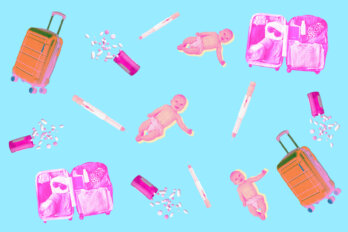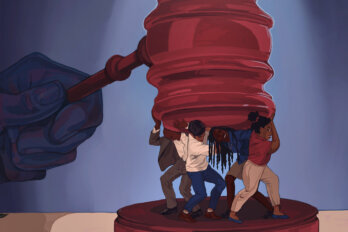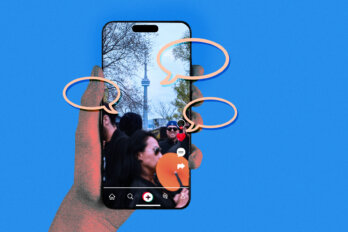In the before times, I rarely went two weeks without a trip to a karaoke bar. My last big night out was last January, halfway around the world, at a Berlin queer bar called Monster Ronson’s Ichiban Karaoke. The host holding court that night was an impossibly hot soft butch with a voice like warm caramel. Soon after the bar opened, she sang “Georgia On My Mind” to set the mood while I stood in the front row, absolutely transfixed. Around 1 a.m., after I’d spent a few hours waiting and anxiously sipping a pilsner, she finally called me onstage. By then, the pit was full of writhing, dancing, shouting, breathing bodies.
My song was The B-52s’ “Rock Lobster.” It’s the best type of karaoke track because it requires no singing talent but insists on a deep commitment to belting out ridiculous lyrics with the utmost conviction: “Here comes a bikini whale!”; “Pass the tanning butter”; “It wasn’t a rock—it was a rock lobster!” I added it to my repertoire after hearing a friend sing it during a community-radio Christmas party at a hot dog restaurant in Calgary. Every time I’ve performed it since—dozens, by now—it’s been a conversation starter.
Berlin was no different. As I gyrated around the stage in my best Fred Schneider impersonation, I felt the crowd closing in around me. But the chorus—if you can call it that—was the best part.
“ROCK! . . . ROCK! . . . ROCK LOB-STAH!”
Every word was a percussive, plosive vocal punch. As the track’s background vocals kicked in, a squiggling wail, two women in the front row started singing along in perfect unison. When the lyrics finally turned to a descending refrain (“Down, down . . . ”), I leaped into the pit below, sinking to the floor, pulsing bodies breathing down on me under a shimmering disco ball.
I had never felt more alive, and now, more than a year into the COVID-19 pandemic, I have no idea when I’ll feel that way again.
Karaoke is the last thing we should be doing right now. From the shared microphones to the passed-around laminated song lists caked in stale beer, a karaoke bar is a hotspot for viral transmission. It’s an activity explicitly designed to crowd a bunch of people into a small space and make them expel germs like firehoses.
Multiple studies have shown exactly how bad of an idea public singing is in this moment: when a person projects their voice, they also project those pesky respiratory droplets that can carry the coronavirus. Researchers at Sweden’s Lund University found that, the louder and more powerfully a song is sung, the greater the concentration of droplets produced, which makes screaming “Rock Lobster” to a crowded room full of maskless strangers the pinnacle of a superspreader event.
Karaoke is also a nonessential service in every sense of the word. The economy does not need it to function in the same way it needs grocery stores or public transit. People were not applauding from their balconies last March to congratulate the karaoke superstars of the world, as much fun as that would’ve been.
Acknowledging the obvious risks, provinces have taken the necessary precautions and banned karaoke outright. Last summer and fall, reopening plans in Alberta, Saskatchewan, and BC upheld bans on most karaoke-like activities. Quebec banned it last September, after more than eighty new COVID-19 cases were linked to a single karaoke event. In Vancouver, Virginia Lynn, who runs Euphonic Entertainment—a for-hire event service specializing in karaoke for bars and other venues—saw nearly a dozen gigs dry up in just a few hours as lockdowns came into effect last year. She was able to plan a few pandemic-safe events during the quiet period over the summer—complete with six-foot spaces between groups and microphones sprayed with sanitizer—but those quickly ended in late July, when BC provincial health officer Bonnie Henry formally recommended against public singing for the foreseeable future. “That just kind of killed every hope and dream I had of coming back,” says Lynn.
Even though vaccine rollouts suggest a coming shift to some form of recognizable social life, karaoke will be one of the last things to return postpandemic. But, after more than a year of staying inside, keeping our distance, and forgoing many of the activities that once brought us joy, collective singing may be the great uniter we need. There are very few places that have the same ability to create a sense of community among strangers. In the eleven years since Lynn started working in the industry, she’s watched friendships born onstage bloom in the outside world—and experienced more than a few herself. “I’ve come across so many different people and different personalities and lifestyles,” she says, “but they would have never met each other had it not been for karaoke night.”
In his book, Don’t Stop Believin’: How Karaoke Conquered the World and Changed My Life, Brian Raftery writes about using karaoke as both “a stimulant and an antidepressant” throughout his life. “Karaoke bars are where I’ve fallen in and out of love, struggled with friendships, and generally observed the world at large,” he writes. “Much of my twenties and early thirties were accompanied by the sound of cheaply produced, vaguely familiar instrumental backing tracks, and even today, it often seems as though the only way I can truly connect with others is through song—even if I do sometimes struggle to remember the right words.”
Raftery travelled the world for the book, singing on stages from New York to Japan, the activity’s birthplace. (He described it as “not so much a vacation as it is a pilgrimage, a heaven on earth where you can actually perform Belinda Carlisle’s ‘Heaven Is a Place on Earth.’”) Japanese businessman and musician Daisuke Inoue is widely credited with inventing the karaoke machine in the early ’70s. He came up with the idea after his band couldn’t fulfill a client’s request for musical backing. In place of live instruments, he sent a prerecorded track that they could sing along to—and it was a hit. Soon afterward, Inoue started to rent out his eleven bulky machines, equipped with eight-track car stereos and amplifiers, to bars across Kobe. After the patent for the karaoke machine was filed, around 1975, the once obscure pastime started gaining popularity in different parts of Asia before making its way to North America in the ’90s.
Now, you’d be hard pressed to find a major city without at least a dozen bars that host karaoke nights. They’ve become gathering places for oddballs and outcasts, friends and coworkers, and performers focused on honing their craft. My favourite locale, Funky Winker Beans (affectionately known as Funky’s), in Vancouver’s Downtown Eastside, was where I learned to come out of my shell. The bar ran karaoke every night of the week, hosted by sullen metalheads while bartenders with lime-green mohawks poured pints. The phrase “No Judgement” was stencilled in white spray paint across the stage’s back wall, above an image of late SNFU frontman and western Canadian punk icon Mr. Chi Pig, as a reminder to both audience and performer: this is a safe space.
For a lot of people, karaoke has always been exactly that: a special place where you aren’t judged on where your talent lies. Instead, it’s all about conviction, expression, and self-discovery. When I step onstage, I get to leave gender at the door and feel like I’m Bruce Springsteen for exactly four minutes and thirty seconds, or turn “Don’t Go Breaking My Heart” into a queer love song. Onstage, you can be both a heightened version of yourself and someone else entirely, for however long the song lasts.
COVID-19 has overwhelmingly reshaped our reality in such a short time, and some of those changes will likely be permanent. Before 2006, limiting the size of our liquids on airplanes seemed unfamiliar, but now the times when we didn’t do so feel like the distant past. The time before every phone had a touch screen can feel like another generation. I can’t help but wonder if karaoke is doomed to follow suit and become just another memory of the “before times.”
Like many bars, Funky’s closed down in mid-March and hasn’t reopened. I don’t know if it ever will. Lynn has watched bars she had contracts with close down, one by one, over the past year, and she’s fearful about what reopened nightlife will look like. “I don’t think it’s ever going to come back the way that it was,” she says. “It’s always going to be different.”
Lynn imagines that, when karaoke does return, it will be on a small scale. There likely won’t be any sweaty mosh pits or unmasked cheering—at least not at first—but she is still eager to reconnect with the community. “We will do whatever we can to get back to just sitting in our seat and waiting our turn to sing a song,” she says.
And what will she sing for that first song back? Either something punny—the “opposite of ‘Closing Time,’” she jokes—or some classic Whitney Houston. “Just to belt it out as hard as I can and revel in the fact that I’m on a stage again,” she says. “It’s been so long.”
As for me, you’d better believe I’m going to sing “Rock Lobster.” And everybody will be rocking, shouting at the top of their lungs, and dancing round and round, finally together again.




